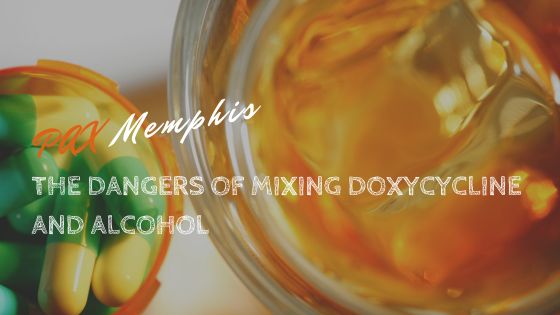Mixing medications and alcohol can have unintended, sometimes dangerous, effects. It’s important to ask your doctor whether you may drink alcohol while taking doxycycline and other types of antibiotics.
People who drink heavily or struggle with alcohol abuse must tell their doctor about their alcohol use before starting to take doxycycline. This article will explore the risks of mixing doxycycline and alcohol. Reach out to the PAX Memphis team if you need help to stop drinking or to find support at any stage of your recovery journey.
What is Doxycycline?
Doxycycline is an antibiotic. Doctors may prescribe doxycycline to treat bacterial infections in many parts of the body, including respiratory diseases. Some people take doxycycline to treat acne or rosacea, a common skin condition that causes redness and sensitivity. Doxycycline may also be used to prevent malaria, which is a disease carried by mosquitoes.
Doxycycline belongs to the tetracycline class of antibiotics. Tetracycline antibiotics prevent bacteria from making proteins, causing the bacteria to stop reproducing and die.
The Dangers of Mixing Doxycycline and Alcohol
Alcohol can interfere with an antibiotic’s ability to fight infection, making it less effective and putting people at risk of worsening conditions. One or two drinks from time time time may not affect doxycycline’s effectiveness, but heavy drinking can keep it from working as it should.
People who mix doxycycline and alcohol may also have unwanted side effects, including:
- Drowsiness
- Dizziness
- Nausea
- Vomiting
- Headache
- Rapid heart rate
Doxycycline may interact with alcohol if people drink heavily or have liver damage from alcohol consumption. Those living with alcoholism or people with a history of heavy drinking may need to take a different antibiotic that will be effective.
The Effects and Risks of Alcohol
Alcohol use is common in the United States. Most adults report drinking alcohol at least occasionally, and alcohol is widely available in many social settings. Most medical experts agree that drinking in moderation isn’t likely to cause severe long or short-term problems.
But many people struggle to control their drinking. Alcohol is addictive, and people can develop tolerance and dependence on it. Drinking alcohol in excess has many short and long-term risks, including:
- Risk of injury from accidents like falling, drowning, or exposure to extreme hot or cold temperatures
- Increased likelihood of being the victim of an assault or other crime
- Risk of being involved in a motor vehicle accident
- Long-term risk of throat, stomach, breast, colon, and other cancers
- Cardiovascular disease
- Stroke
- Liver disease
- Pancreatitis
- High blood pressure
People who drink heavily may be more likely to develop a tolerance to alcohol–meaning that they need to drink more to feel “buzzed” or drunk. They may drink more alcohol or drink more frequently. These behaviors increase the likelihood that a person will develop dependence or addiction to alcohol.
What is Alcoholism?
Alcoholism is defined as a complete lack of control over alcohol consumption. People with alcoholism are physically dependent on alcohol and must drink in order to function. Without consuming alcohol, people with alcoholism will experience dangerous, sometimes life-threatening withdrawal symptoms.
So, how does alcoholism develop? People who drink heavily for extended periods may develop physical dependence. The Centers for Disease Control and Prevention (CDC) recommends that people who drink alcohol should only drink in moderation. Moderate drinking is defined as:
- One or fewer drinks per day for women
- Two or fewer drinks per day for men
Heavy drinking means consuming more alcohol than recommended over the course of a week. For women, this means drinking eight or more alcoholic beverages weekly. For men, fifteen or more drinks per week would be considered heavy drinking.
It’s also important to note that a “drink” doesn’t mean a standard drink you might get in a bar or restaurant. A “drink” is defined as:
- 5 ounces of wine
- 12 ounces of beer
- 8 ounces of malt liquor
- 1.5 ounces of distilled spirits
Heavy drinking changes how your body and brain work. These changes make it very difficult to stop drinking when you want to–even when the consequences of alcohol abuse become severe.
People who drink heavily or who have developed alcoholism must be cautious about taking certain medications. Mixing doxycycline and alcohol may cause worsening infections and other long-term health problems. It’s important to talk to your doctor about your drinking and find professional substance abuse treatment if you realize you can’t stop drinking on your own.
Get Help Now
Mixing doxycycline and alcohol can be dangerous for people who drink heavily or live with alcoholism. If you or someone you love struggle with alcohol misuse, you are not alone. Reach out to the PAX Memphis team now to learn about our supportive, comprehensive alcohol rehab programs.
Alcohol abuse is a complex condition that requires compassionate, holistic treatment. Don’t wait another day for the help you need. Start your recovery journey today by reaching out to the PAX Memphis specialists.
Medically Reviewed: September 25, 2019

All of the information on this page has been reviewed and verified by a certified addiction professional.










